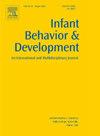A qualitative exploration of parents’ experiences of infant and toddler sleep and feeding during the United Kingdom COVID-19 lockdown(s)
IF 2
3区 心理学
Q3 PSYCHOLOGY, DEVELOPMENTAL
引用次数: 0
Abstract
COVID-19 restrictions had a significant impact on family life, including daily activities and routines. This study aimed to explore the impact of the COVID-19 pandemic on children’s sleep and feeding behaviours, through undertaking reflexive thematic analysis of parents' open-text box responses to survey questions related to their child’s sleep and feeding practices during COVID-19 restrictions. Six hundred and ninety one parents of children aged 0–24 months old who were living in the United Kingdom completed an online questionnaire between 14th December 2020 and 15th January 2021. Results suggested that the pandemic resulted in specific contemporaneous changes to feeding and sleep practices. Specifically, for feeding there were positives around an extension to breastfeeding but this was alongside a negative perception of increased breastfeeding demand. For sleep practices, parents reported primarily negative implications of poorer child sleep and an increase in reactive bedsharing. Overall there were some positive implications on general practices which impacted both sleep and feeding, including providing the opportunity for parents to make beneficial adjustments such as to their routines. However, there were also clear negative implications around practical challenges and a lack of formal and informal help and support. This is the first study to explore the impact of the pandemic and its associated restrictions (which offered a unique snapshot in time, unable to be experimentally replicated) on infant and toddler sleeping and feeding practices. Findings have implications beyond the pandemic as they provide an illustration of the ways in which parents, if afforded with favourable circumstances such as additional time, flexibility, a reduction in perceived pressure and social stigma may seek to change their child’s sleeping and feeding practices. In addition, specific child sleep and feeding behaviours which parents struggled with and may benefit from additional help and support in a post-pandemic context to contribute to children’s development and well-being are highlighted.
对英国COVID-19封锁期间父母婴幼儿睡眠和喂养经历的定性探索。
COVID-19限制措施对家庭生活,包括日常活动和日常生活产生了重大影响。本研究旨在探讨COVID-19大流行对儿童睡眠和喂养行为的影响,通过对父母在COVID-19限制期间对儿童睡眠和喂养行为相关调查问题的开放式文本框回答进行反身性主题分析。在2020年12月14日至2021年1月15日期间,居住在英国的691名0-24个月大儿童的父母完成了一份在线问卷。结果表明,大流行导致了喂养和睡眠习惯的特定同期变化。具体来说,对于喂养来说,延长母乳喂养是积极的,但同时也有对母乳喂养需求增加的负面看法。对于睡眠习惯,家长们报告的主要负面影响是孩子睡眠质量较差和反应性同床共枕的增加。总的来说,在影响睡眠和喂养的一般做法方面,有一些积极的影响,包括为父母提供机会,让他们做出有益的调整,比如调整他们的日常生活。然而,在实际挑战和缺乏正式和非正式的帮助和支持方面,也有明显的负面影响。这是探索大流行及其相关限制(提供了独特的时间快照,无法通过实验复制)对婴幼儿睡眠和喂养做法影响的第一项研究。调查结果的影响超出了大流行的范围,因为它们说明了父母在获得诸如额外时间、灵活性、减轻所感受到的压力和社会耻辱等有利条件的情况下,可能会设法改变孩子的睡眠和喂养习惯。此外,还强调了父母难以理解的特定儿童睡眠和喂养行为,这些行为可能受益于大流行后背景下的额外帮助和支持,以促进儿童的发展和福祉。
本文章由计算机程序翻译,如有差异,请以英文原文为准。
求助全文
约1分钟内获得全文
求助全文
来源期刊

Infant Behavior & Development
PSYCHOLOGY, DEVELOPMENTAL-
CiteScore
4.10
自引率
4.80%
发文量
94
期刊介绍:
Infant Behavior & Development publishes empirical (fundamental and clinical), theoretical, methodological and review papers. Brief reports dealing with behavioral development during infancy (up to 3 years) will also be considered. Papers of an inter- and multidisciplinary nature, for example neuroscience, non-linear dynamics and modelling approaches, are particularly encouraged. Areas covered by the journal include cognitive development, emotional development, perception, perception-action coupling, motor development and socialisation.
 求助内容:
求助内容: 应助结果提醒方式:
应助结果提醒方式:


